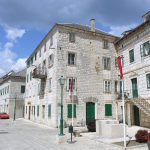The serious drought in Dalmatia set off a chain of events catastrophic for all people in the area who make their living from any branch of agriculture. First the crops started withering; olive groves dried up, as well as vineyards and lavender fields. There’s one other problem, though, a thing not many of us would think to associate with a drought: bees.
As there still hasn’t been any heavy rain in Dalmatia, especially on certain islands and in the area around Imotski, bees don’t have anything to feed on. First, the beekeepers had to feed their honey bee colonies through the spring, as the area was ravaged by ice storms in winter; then they had to repeat the process during summer as nature didn’t manage to liven up again. Honey bees usually feed on natural pollen and nectar from flowers, and if there is little (or none) to be found in nature, beekeepers feed them supplements such as pollen patties.
Željko Tomas, a beekeeper from Imotski and a member of the veteran cooperative Pauk Čeka, was taken aback by the high bee mortality when he checked on his apiaries a couple of days ago. “Here’s all our hard work and our efforts. Horrible! Everything is dead”, said Tomas, explaining the bees are dying of starvation. Honey production is at its lowest, bees don’t manage to survive, and artificial food is expensive – all of that results in massive bee mortality, like the one Tomas is currently experiencing.
One pollen patty costs 12 kuna, and it will last you three days. When you have 130 beehives that had to be kept alive artificially since the spring, and when you know you’ll have to keep feeding the bees on your own as there’s no honey for them to feed on, the expenses add up.
“When you do the math, you’ll see we need tonnes of patties, and we got just a bit of honey in a single location, there’s nothing elsewhere. There are beekeepers associations operating both on the county and the state level, but they obviously have no interest in problems of those beekeepers who can’t move their apiaries to Lika or Slavonija”, said Tomas. “Bees don’t eat rocks, dry bushes or grass, they need flowers, and there are none at this moment. We can’t afford to move our hives to Lika, Slavonija or Bosnia. No one thinks about us or offers to help in any way”, stated Tomas, adding that the Beekeepers Association in Slavonija supports the beekeepers in the region.
“We’re not asking for money, we only need help in co-financing the procurement of patties or sugar, because we simply can’t afford to buy bee food anymore. The association shows interest only when they need to charge us for membership”, Tomas concluded.
Source: Lokalni








